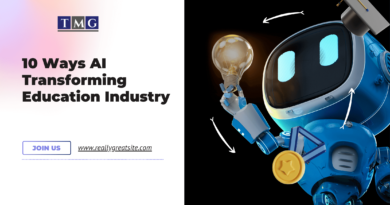AI Startup Ideas and Their Key Features Industry Wise
Artificial Intelligence (AI) has become a cornerstone of modern technology, driving innovation across various sectors. According to a report by McKinsey, AI could deliver up to $13 trillion in additional global economic activity by 2030, increasing global GDP by about 1.2% annually. With businesses increasingly integrating AI into their operations, the demand for AI-driven solutions continues to soar. This article explores some of the most profitable AI startup ideas that can transform industries and generate substantial revenue.
How Businesses Are Using Artificial Intelligence in Their Operations
Businesses today leverage AI to optimize operations, enhance customer experiences, and drive growth. Here are a few ways AI is being used:
- Automation of Routine Tasks: AI-powered automation helps businesses reduce operational costs and improve efficiency by automating repetitive tasks.
- Customer Service: Chatbots and virtual assistants provide instant customer support, improving response times and customer satisfaction.
- Predictive Analytics: AI algorithms analyze data to forecast trends, enabling businesses to make informed decisions and stay ahead of the competition.
- Personalization: AI tailors marketing efforts and product recommendations to individual customer preferences, increasing engagement and sales.
What Are the Most Profitable AI Startup Ideas?
As AI technology continues to evolve, numerous startup opportunities arise. Here are some of the most promising AI startup ideas:
AI-Based Retail Assistance Solution
Retail businesses can benefit greatly from AI-driven assistance solutions. These platforms can analyze customer behavior, manage inventory, and optimize pricing strategies. Key features of an AI-based retail assistance solution include:
- Personalized Shopping Experience: AI algorithms suggest products based on customer preferences and past purchases.
- Inventory Management: Predictive analytics help maintain optimal inventory levels, reducing stockouts and overstock situations.
- Dynamic Pricing: AI adjusts prices in real-time based on demand, competition, and other factors to maximize profits.
AI-Based Entertainment Platform
An AI-based entertainment platform can revolutionize how users consume content. By leveraging AI, these platforms can offer personalized content recommendations, enhance user experiences, and optimize content delivery. Key components include:
- Content Recommendation Engine: AI analyzes user preferences and viewing history to suggest relevant content.
- Sentiment Analysis: AI gauges user feedback to improve content quality and user satisfaction.
- Content Creation: AI tools assist in generating engaging content, from music and videos to articles and social media posts.
AI-Based Recruitment App
Recruitment can be streamlined with AI-driven apps that match candidates with job openings more effectively. Features of an AI-based recruitment app include:
- Resume Screening: AI scans and evaluates resumes, highlighting the most suitable candidates.
- Interview Scheduling: Automated scheduling saves time for both recruiters and candidates.
- Candidate Matching: AI algorithms match job descriptions with candidate profiles to find the best fit.
AI-Based Logistics and Supply Chain Management Solution
AI can transform logistics and supply chain management by optimizing routes, reducing costs, and improving efficiency. Key features include:
- Route Optimization: AI algorithms find the most efficient delivery routes, reducing fuel costs and delivery times.
- Demand Forecasting: Predictive analytics help manage inventory levels and anticipate demand fluctuations.
- Supply Chain Visibility: AI provides real-time tracking and monitoring of goods, ensuring transparency and accountability.
AI Healthcare Platform
AI in healthcare can improve patient outcomes, streamline operations, and reduce costs. An AI healthcare platform can offer:
- Diagnostic Tools: AI-powered diagnostic tools assist doctors in identifying diseases and recommending treatments.
- Predictive Analytics: AI predicts patient health trends, enabling proactive care and intervention.
- Personalized Treatment Plans: AI tailors treatment plans to individual patient needs based on data analysis.
AI Marketing App
An AI marketing app can enhance marketing strategies by providing insights into customer behavior and optimizing campaigns. Features include:
- Customer Segmentation: AI segments customers based on behavior, preferences, and demographics for targeted marketing.
- Campaign Optimization: AI analyzes campaign performance and suggests improvements for better results.
- Content Generation: AI tools create engaging marketing content, from social media posts to email newsletters.
AI Content Creation Tool
Content creation can be time-consuming, but AI tools can streamline the process by generating high-quality content quickly. Key features of an AI content creation tool include:
- Natural Language Processing: AI understands and generates human-like text, producing articles, blog posts, and reports.
- Content Personalization: AI tailors content to the target audience’s preferences and interests.
- Plagiarism Detection: AI ensures content originality by checking for plagiarism and suggesting improvements.
AI eLearning Platform
AI-powered eLearning platforms offer personalized learning experiences, making education more accessible and effective. Key features include:
- Adaptive Learning: AI adjusts course content based on individual learner progress and performance.
- Personalized Recommendations: AI suggests courses and resources based on learner interests and goals.
- Automated Grading: AI grades assignments and provides feedback, saving time for educators.
AI Energy Optimization Solution
AI can optimize energy consumption, reducing costs and environmental impact. An AI energy optimization solution can offer:
- Energy Usage Monitoring: AI tracks and analyzes energy usage patterns to identify inefficiencies.
- Predictive Maintenance: AI predicts equipment failures and schedules maintenance to prevent downtime.
- Automated Energy Management: AI adjusts energy consumption in real-time based on demand and availability.
AI-Based Smart Finance Robotic Process Automation App
AI can revolutionize finance by automating processes and providing valuable insights. Key features of an AI-based finance app include:
- Automated Bookkeeping: AI handles routine accounting tasks, reducing errors and saving time.
- Expense Management: AI tracks expenses and suggests cost-saving measures.
- Financial Forecasting: AI analyzes financial data to predict trends and support strategic planning.
AIoT App
The integration of AI and the Internet of Things (IoT) can create innovative solutions that enhance efficiency and connectivity. An AIoT app can offer:
- Smart Home Automation: AI controls smart devices, optimizing energy usage and improving convenience.
- Predictive Maintenance: AI monitors IoT devices and predicts maintenance needs to prevent failures.
- Data Analytics: AI analyzes data from IoT devices to provide actionable insights.
AI-Driven Cybersecurity App
With the increasing number of cyber threats, AI-driven cybersecurity apps are essential for protecting data and systems. Key features include:
- Threat Detection: AI identifies and mitigates cyber threats in real-time.
- Behavioral Analysis: AI monitors user behavior to detect anomalies and potential security breaches.
- Automated Response: AI automates threat response, reducing the time it takes to address security issues.
How Do AI Startups Make Money?
AI startups have various revenue streams depending on their business models and target markets. Common ways AI startups generate revenue include:
- Subscription Services: Offering AI tools and platforms on a subscription basis provides a steady revenue stream.
- Licensing: Licensing AI technology to other businesses for a fee.
- Consulting Services: Providing expertise and customized AI solutions to businesses.
- Data Monetization: Selling insights derived from data analysis to other companies.
- Product Sales: Selling AI-powered products, such as devices or software, to consumers and businesses.
In conclusion, the potential for AI startups is vast, with opportunities across various sectors. By leveraging AI technology, entrepreneurs can create innovative solutions that address real-world problems, drive efficiency, and generate significant profits. Whether you are interested in retail, healthcare, finance, or cybersecurity, AI offers a plethora of possibilities for building a successful startup.




